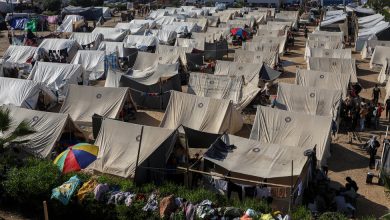Boat With at Least 160 Rohingya Refugees Is Stranded at Sea

DHAKA, Bangladesh — The United Nations on Tuesday appealed to countries in South Asia to help rescue a boat carrying at least 160 Rohingya refugees stranded in the Andaman Sea without food for weeks.
The situation unfolded as Rohingya refugees continued to undertake the perilous journey from Bangladesh, where they have lived for years in squalid shanties since fleeing their homes in Myanmar in the aftermath of a military-perpetrated massacre.
On Sunday, local fishermen and the Sri Lankan Navy rescued another boat with more than 100 Rohingya refugees, nearly two-thirds of them women and children, after repeated calls from activists and human rights groups.
At least 161 refugees, most of them Rohingya Muslims, are already dead or missing since January after attempting dangerous voyages in the Bay of Bengal and the Andaman Sea, the United Nations’ refugee agency has said.
“We have been in touch with maritime authorities in India and Sri Lanka to please help us go save them,” Babar Baloch, a spokesman for the United Nations’ refugee agency in Bangkok, said of the stranded boat. “Our worry is, if no action is taken, many more may end up dying in the sea.”
Mohammed Rezuwan Khan, a Rohingya activist in Cox’s Bazar, the site of many refugee camps, said that at least three people, including two children, had died on the boat, which was stranded near the Andaman and Nicobar Islands.
The boat, which was destined for Malaysia, had engine failure, he said. After going hungry and thirsty for weeks, the people on the boat “have been crying, calling for aid,” Mr. Khan said. “‘Please rescue us in any possible way.’”
As of Tuesday afternoon, officials in the Indian Navy and India’s National Disaster Management Authority said they had received no information about the stranded boat.
The Rohingya, a Muslim ethnic minority from Rakhine State in Myanmar, are among the most persecuted groups of people. Since 2017, more than 900,000 have crossed into Bangladesh, fleeing a vicious military campaign of killing, rape and arson in Buddhist-majority Myanmar, which sees them as foreign interlopers.
The United Nations has called Myanmar’s persecution of Rohingya Muslims “a textbook example of ethnic cleansing,” setting off the biggest forced migration in history since the 1994 genocide in Rwanda.
Refugees in the camps in Bangladesh have suffered from floods that have turned settlements into fast-flowing rivers overnight, and fires, including one last year that killed at least 15 people and left tens of thousands homeless.
In search for a better life, Rohingya refugees often fall for empty promises made by illegal traffickers and smugglers, who have no regard for their safety.
In one typical voyage, more than 100 Rohingya refugees arrived in Indonesia in November after a monthlong journey that left them weak and hungry, as they tried to reach Malaysia.
“Living in a camp is certainly not the life that anyone would want for themselves,” said Mizanur Rahman, a senior official at the Office of the Refugee Relief and Repatriation Commissioner in Cox’s Bazar. “These people are human beings, and we cannot keep them locked up in the camps forever.”
Even after leaving the camps, the Rohingya are faced with detention or deportation for trying to cross borders. In Sri Lanka, the more than 100 refugees who were rescued at sea over the weekend were ordered by a local court to be sent to a detention center in the Sri Lankan capital, Colombo, the authorities said.
Their boat, which had malfunctioned and drifted toward the island nation, was heading to Indonesia, said Capt. Gayan Wickramasuriya, a spokesman for the Sri Lanka Navy.
Mr. Khan, the Rohingya activist, said that one of the refugees on the boat that was stranded was his sister Hatemonesa, 27, who was attempting the journey with her 5-year-old daughter, Umme Salima, with whom she was pregnant when she lost her husband.
“She was alone with two children,” he said. “Now, she finally decided to take the dangerous journey to the sea.”
Skandha Gunasekara contributed reporting from Colombo, Sri Lanka.




